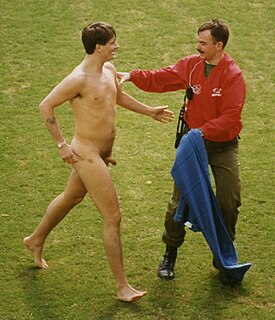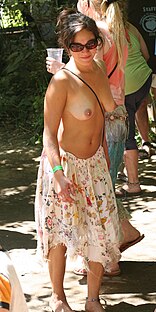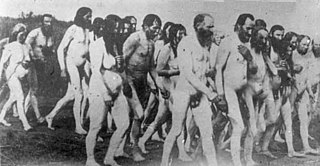Related Research Articles

Indecent exposure is the deliberate public exposure by a person of a portion of their body in a manner contrary to local standards of appropriate behavior. Laws and social attitudes regarding indecent exposure vary significantly in different countries. It ranges from outright prohibition of the exposure of any body parts other than the hands or face to prohibition of exposure of certain body parts, such as the genital area, buttocks or breasts.

Exhibitionism is the act of exposing in a public or semi-public context one's intimate parts – for example, the breasts, genitals or buttocks. The practice may arise from a desire or compulsion to expose themselves in such a manner to groups of friends or acquaintances, or to strangers for their amusement or sexual satisfaction, or to shock the bystander. Exposing oneself only to an intimate partner is normally not regarded as exhibitionism. In law, the act of exhibitionism may be called indecent exposure, "exposing one's person", or other expressions.

Topfreedom is a cultural and political movement seeking changes in laws to allow women to be topless in public places where men are permitted to be barechested, as a form of gender equality. Specifically, the movement seeks the repeal or overturning of laws which restrict a woman's right not to have her chest covered at all times in public.

The monokini, designed by Rudi Gernreich in 1964, consisting of only a brief, close-fitting bottom and two thin straps, was the first women's topless swimsuit. His revolutionary and controversial design included a bottom that "extended from the midriff to the upper thigh" and was "held up by shoestring laces that make a halter around the neck." Some credit Gernreich's design with initiating, or describe it as a symbol of, the sexual revolution.

Toplessness refers to the state in which a woman's breasts, including her areolas and nipples, are exposed, especially in a public place or in a visual medium. The male equivalent is barechestedness, also commonly called shirtlessness.

Sherry Glaser is an American actress, noted for her performance in the off-Broadway solo show Family Secrets about a Jewish family in California.
Clothing laws vary considerably around the world. In most countries, there are no laws which prescribe what clothing is required to be worn. However, the community standards of clothing are set indirectly by way of prosecution of those who wear something that is not socially approved. Those people who wear insufficient clothing can be prosecuted in many countries under various offences termed indecent exposure, public indecency, nudity or other descriptions. Generally, these offences do not themselves define what is and what is not acceptable clothing to constitute the offence, and leave it to a judge to determine in each case.
The ages of consent for sexual activity vary from age 15 to 18 across Australia, New Zealand and other parts of Oceania. The specific activity and the gender of its participants is also addressed by the law. The minimum age is the age at or above which an individual can engage in unfettered sexual relations with another person of minimum age. Close in age exceptions may exist and are noted where applicable. In Vanuatu the homosexual age of consent is set higher at 18, while the heterosexual age of consent is 15. Same sex sexual activity is illegal at any age for males in Papua New Guinea, Kiribati, the Cook Islands, Samoa, Tonga and Tuvalu; it is outlawed for both men and women in the Solomon Islands. In all other places the age of consent is independent of sexual orientation or gender.

Nudity is sometimes used as a tactic during a protest to attract media and public attention to a cause, and sometimes promotion of public nudity is itself the objective of a nude protest. The use of the tactic goes back to well published photos of nude protests by svobodniki in Canada in 1903. The tactic has been used by other groups later in the century, especially after the 1960s. Like public nudity in general, the cultural and legal acceptance of nudity as a tactic in protest also varies around the world. Some opponents of any public nudity claim that it is indecent, especially when it can be viewed by children; while others argue that it is a legitimate form of expression covered by the right to free speech.
Mariana Valverde is a Canadian criminologist and sociologist. She is currently a professor in the Centre for Criminology and Sociolegal Studies at the University of Toronto. Her research mainly focuses on the sociology of law. She is also an occasional contributor to Spacing magazine.
The legal status of striptease varies considerably among different countries and the various jurisdictions of the United States. Striptease is considered a form of public nudity and subject to changing legal and cultural attitudes on moral and decency grounds. Some countries do not have any restrictions on performances of striptease. In some countries, public nudity is outlawed directly, while in other countries it may be suppressed or regulated indirectly through devices such as restrictions on venues through planning laws, or licensing regulations, or liquor licensing and other restrictions.
Lascivious behavior is sexual behavior or conduct that is considered crude and offensive, or contrary to local moral or other standards of appropriate behavior. In this sense "lascivious" is similar in meaning to "lewd", "indecent", "lecherous", "unchaste", "licentious" or "libidinous".
Sexuality in the Philippines encompasses sexual behavior, sexual practices, and sexual activities exhibited by men and women of the Philippines past and the present. It covers courtship strategies for attracting partners for physical and emotional intimacy, sexual contact, sexual reproduction, building a family, and other forms of individual interactions or interpersonal relationships, as set and dictated by their culture and tradition, religion, beliefs, values and moral convictions, psychology, foreign influences, and other related factors.

Femen is a radical feminist activist group whose goal is to protect women's rights. The organization became internationally known for organizing controversial topless protests against sex tourism, religious institutions, sexism, homophobia, and other social, national, and international topics. Founded in Ukraine, the group is now based in France. Femen describes its ideology as being "sextremism, atheism and feminism".
The passage of the Canadian Charter of Rights and Freedoms in 1982 allowed for the provision of challenging the constitutionality of laws governing prostitution law in Canada in addition to interpretative case law. Other legal proceedings have dealt with ultra vires issues. In 2013, three provisions of the current law were overturned by the Supreme Court of Canada, with a twelve-month stay of effect. In June 2014, the Government introduced amending legislation in response.
Bara Bröst network is a cultural movement of Swedish feminists campaigning for the right of women to swim topless and to bare their breasts at beaches and in public pools.

The Outdoor Co-ed Topless Pulp Fiction Appreciation Society was a group of several dozen women and a few men that had, since August 17, 2011, organized regular gatherings around New York City, meeting to read and discuss books in public while topless. The primary objective of the group, besides enjoying the sun and book reading, was to create awareness that New York law allows toplessness in public, and to change social attitudes to the exposure of women's breasts. The group's blog had reported that there had been no harassment of the participants by the police, and very rarely by the public.
Topfreedom in Canada has largely been an attempt to combat the interpretation of indecency laws that considered a woman's breasts to be indecent, and therefore their exhibition in public an offence. In British Columbia, it is a historical issue dating back to the 1930s and the public protests against materialistic lifestyle held by the radical religious sect of the Freedomites, whose pacifist beliefs led to their exodus from Russia to Canada at the end of the 19th century. The Svobodniki became famous for their public nudity: mostly for their nude marches in public and the acts of arson committed also in the nude.
Free the Nipple is a topfreedom campaign created in 2012 during pre-production of a 2014 film of the same name. The campaign highlights the general convention of allowing men to appear topless in public while considering it sexual or indecent for women to do the same, and asserts that this difference is an unjust treatment of women. The campaign argues that it should be legally and culturally acceptable for women to bare their nipples in public.

In the United States, states have primary jurisdiction in matters of public morality. The topfreedom movement has claimed success in a few instances in persuading some state and federal courts to overturn some state laws on the basis of sex discrimination or equal protection, arguing that a woman should be free to expose her chest in any context in which a man can expose his. Other successful cases have been on the basis of freedom of expression in protest, or simply that exposure of breasts is not indecent.